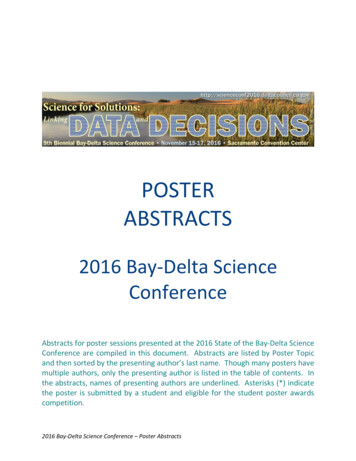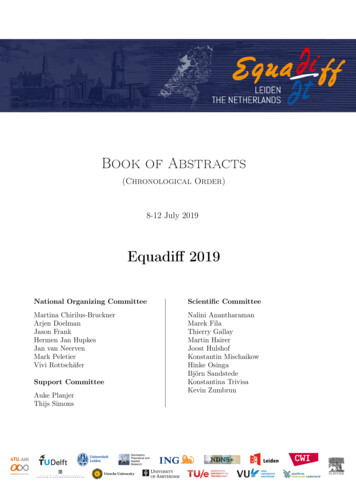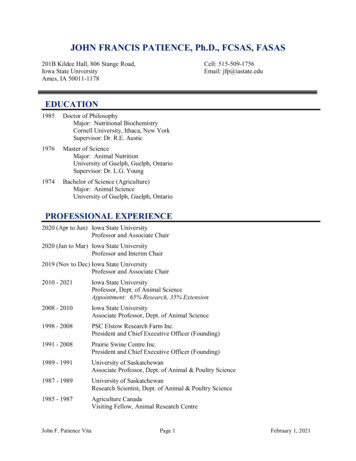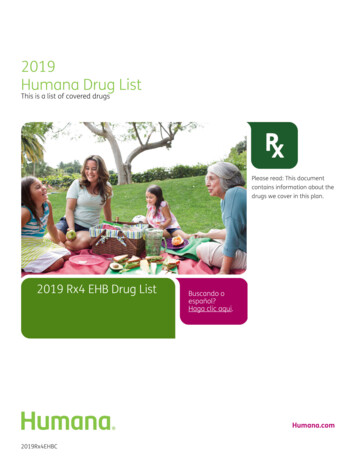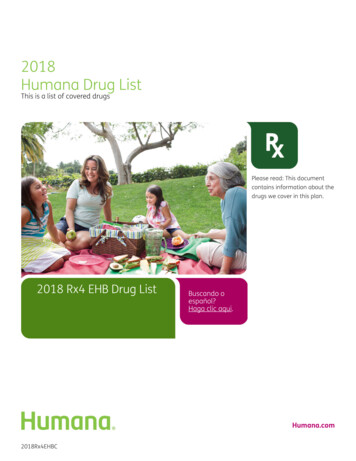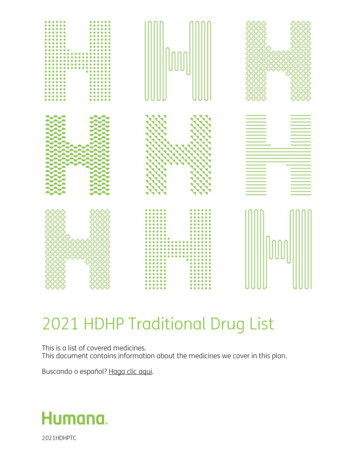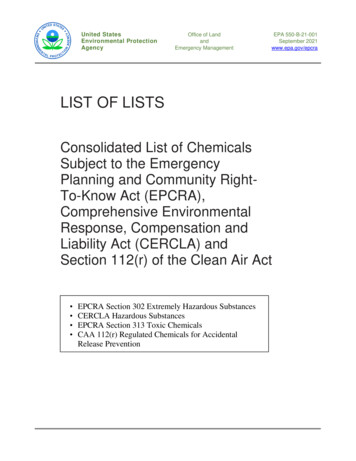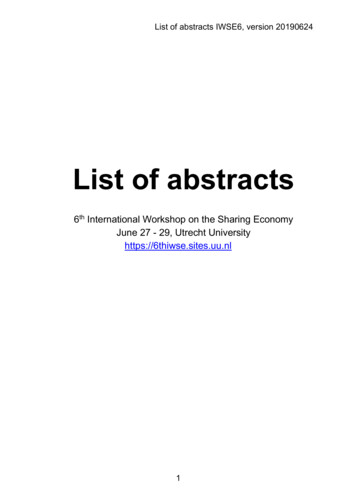
Transcription
List of abstracts IWSE6, version 20190624List of abstracts6th International Workshop on the Sharing EconomyJune 27 - 29, Utrecht Universityhttps://6thiwse.sites.uu.nl1
List of abstracts IWSE6, version 20190624IndexParallel session 1a - Reputation1. Peer reviews and community rating: The effect of seller reputation on a peer-topeer marketplace - Marielle Non2. Creating a unified reputation platform for the sharing economy - Ayelet Gordon3. Legal landscapes of sharing economy: the national legal responses to Airbnb andUber: the case of Greece - Natalia Avlona4. Digital discrimination – The role of reputation systems - Judith KasParallel session 1b - Urban Sharing 11. How do food delivery platforms affect urban logistics? An exploratory surveycentred on Barcelona - Eduard Alvarez2. Spatial impact of a peer-to-peer platform’s online transactions in Hungarian cities Dóra Bálint3. Sharing economy, collaborative Initiatives and circular consumption: The case ofGothenburg - Rannveig Edda Hjaltadottir4. Location, location, location, or is there more? Uncovering the spatiality of Airbnb inUtrecht - Egbert van der ZeeParallel session 1c - Business Models 11. Service delivery in the sharing economy: Assumptions and technologyaffordances for service interactions on ridesharing platforms - Anita Bhappu2. The internationalization of sharecoms - Heidi Coral Thornton3. Airbeds, apartments and hotels: The professionalization of Airbnb across Europe Kristóf Gyódi4. From chains to platforms? Exploring the challenges of digital platforms for theglobal value chain-approach - Erwin Van TuijlParallel session 1d - Legal issues1. Actual problems of contract law in sharing economy - Irina Aiusheeva2. The role of trade marks in the sharing economy - Marta Cernadas Lázare3. The legal implications of the sharing economy in an island state: The case ofMalta - Jasmine Farrugia4. Measuring consumerism in the sharing economy: A design for an empowering,informative tool - Rosalie Koolhoven2
List of abstracts IWSE6, version 20190624Parallel session 2a - Cooperation1. Practices of sharing - civil competences and potentials within collaborativeconsumptions: On the example of a collaborative soup kitchen - Gerrit Retterath2. Governance mechanisms in non-monetary platforms of collaborative consumption- Janaina Schiavini3. Social regulation as a measure to prevent conflicts in community gardens Thomas Sabitzer4. Social dilemma’s in the sharing economy - Rense CortenParallel session 2b - Mobility1. Stocktaking and assessment of urban circular & collaborative economy initiatives Madaline Nunu2. Implications of car sharing practice on households’ travel patterns – Do peopledrive more after staring car sharing, and what about other possible rebound effects?- Eivind Farstad3. How an ambiguous concept performs its network: The case of mobility-as-aservice - Gianluca Chimenti4. Finding the right policy measures to reach 100,000 shared cars – Insights from anexpert workshop - Karla MünzelParallel session 2c - Business Models 21. Incumbents and business model innovation for the sharing economy: Implicationsfor sustainability - Francesca Ciulli2. There Are Platforms As Alternatives (TAPAS): Towards new business models andforms of labor - Guillaume Compain3. The interrelated tensions of the collaborative consumption paradox - HugoGuyader4. A different path to ecosystem strategy: The case of platform cooperatives Jovana KaranovicParallel session 2d - Institutions 11. Digital platforms at the center of a “theoretical representations crisis": case studyof the mobility sector in France - Mathilde Abel2. Collaborative economy in social media – Collective action in Sweden - ChristinaÖberg3. Your Uber is arriving now: An analysis of platform location decisions through aninstitutional lens - Matthijs Punt4. Riding the hype train: The corporate co-optation process in the German3
List of abstracts IWSE6, version 20190624carsharing market - Taneli VaskelainenParallel session 3a - Trust1. Enabling sharing and resource efficiency among neighbours by comparing trustand social cohesion in Sweden and the Netherlands - Charlie Gullström2. The difference in generalized and direct reciprocity when comparing traditionaland sharing economy hospitality industry - Eva Hofmann3. In sharing we trust: The shifting meaning of trust across the access spectrum Viswanathan Venkateswaran4. Who trusts whom in the sharing economy? - Christina ÖbergParallel session 3b - Environmental Impact1. Is car-sharing "green"? Life-cycle greenhouse gas emissions behind sharedmobility - Levon Amatuni2. Environmental aspects of expanding carsharing activities: A system thinkingapproach - Zahra Shams Esfandabadi3. On public opinion: Perceived impact of p2p accommodation platforms in Europe Christina Miguel4. Value co-creation practices facilitated by sharing platforms - Steven CurtisParallel session 3c - HRM1. Platform workers: The denial of an employment relationship? - Eloisa Federici2. Work in the gig economy: How platform design and governance shape worksuccess and satisfaction - Adeline Frenzel3. A structured mapping of the challenges telated to the working conditions ofplatform work: Identifying drivers and potential responses - Karolien Lenaerts4. Exploring ‘human resource management without employment’ in the gig economy:How online labor platforms manage institutional complexity - Jeroen MeijerinkParallel session 3d - Coops1. Conceptualizing the institutional complexity of community-based enterprises Taneli Vaskelainen2. Differences in environmental embeddedness of organizational forms: The case ofsharing economy organizations in Germany - Dominika Wruk3. Market transformation as social movement: The case of platform cooperativism Jonas Pentzien4. Platform workers in control: Reinventing worker cooperatives in the gig economy -4
List of abstracts IWSE6, version 20190624Damion BundersParallel session 4a - Participation1. Individualism vs. collectivism in a Sharing Economy context: A study on whatdetermines Portuguese consumers’ participation - João Cotrim2. Motives for food sharing: A quantitative study in Germany, Austria, andSwitzerland - Karin Dobernig3. Who shares and why? Assessing the potential for peer-to-peer mobilityinnovations to reduce CO2 emissions - Laurie Kerr4. The interplay between self-perception and self-signalling: Exploring motivationsand barriers to using pre-owned and shared goods - Carmela BosangitParallel session 4b - Urban Sharing 21. Sharing cities coalitions: Steps forward for the collaborative collective actions inthe transformation of the contemporary societies - Monica Bernardi2. Sharing “Intrigue and Love”: Public bookcases in Vienna - Sarah Marth3. A (digital) tale of two cities. Narratives and counter-narratives of collaborativeaccommodation platforms in Barcelona and Madrid - Julie Wilson4. The role of city governments in the sharing economy - Yuliya Voytenko PalganaParallel session 4c - Individual Behavior 11. Exploring psychological ownership in access-based fashion consumption - BaderAlkaffary2. Sociodemographic prole of collaborative platform users in Europe: A regressionanalysis - Daniel Liviano Solís3. Teaching design for sustainability through design for sharing - Rosana Vasques4. Are AirBnB and Uber perceived as part of the sharing economy? An analysis of arepresentative survey of German consumers - Barbara HartlParallel session 4d - Institutions 21. Conceptualizing the gig economy and its regulatory problems - Jaap vanSlagteren2. Sharing for a better future? On the sharing economy and imagined future states ofsociety - Sebastian Jürss3. Shades of hybridity: Uncovering the variation, rigidities, and flexibilities of sharingeconomy hybrid governance - Yaomin Zhang4. An institutional logics perspective on the gig economy - Koen Frenken5
List of abstracts IWSE6, version 20190624Parallel session 5a - Social Impact1. Social impact of the sharing economy – A literature review - Alexandra Kessler2. Economic and social impact through complementary currency systems - SusanaMartín Belmonte3. Unravelling sharing economy: Experiences from Hong Kong - Michael Lai4. Towards a framework to evaluate the social impacts of the sharing economy as apractice - Jagdeep SinghParallel session 5b - Policy1. Trade Union response in the on-line gig economy - Nikolaos Koutsimpogiorgos2. Regulating the platform economy - Monica Postiglione3. A framework to assess the pro-democratization of Platform Economy: The case ofBarcelona - Mayo Fuster4. Are platform cooperatives viable? - Martijn AretsParallel session 5c - Individual Behavior 21. Sharing or trading in Airbnb? The influence on price of commercial hosts insouthern Europe cities - Josep Lladós-Masllorens2. Service failures in the sharing economy: Consumer tolerance towardscollaborative service quality - Jérôme Mallargé3. Market situations in digital two-sided industries: An agent-based simulationapproach - Clara Wolff4. Learning through conflict: The case of ridesharing in Indonesia as a battlegroundfor governance experimentation - Suci Lestari Yuana6
List of abstracts IWSE6, version 20190624Session 1aReputation7
List of abstracts IWSE6, version 20190624Peer reviews and community rating: the effect of sellerreputation on a peer-to-peer marketplaceAuthors:Marielle Non (CPB), Martijn Dijkstra (CPB), Roel van Elk (CPB) and Gustaaf Wijnker(CPB, NZa)Abstract:On online peer-to-peer marketplaces, buyers and sellers typically have never met inperson. To facilitate trust in such a relatively anonymous environment, manymarketplaces include a review system where buyers and sellers rate each other. Weuse data from a large Dutch platform for electronics enthusiasts that includes aconsumer-to-consumer marketplace where platform members can buy and sellsecond-hand electronics to investigate the effect of user reputation on sale success.The marketplace has a review system where buyers and sellers rate each other.Moreover, an important feature that sets this marketplace apart from e.g. eBay andEtsy is that the platform itself also has a system to reward general contributions tothe community, like writing a review of a new product. This community rating mightgive additional information on top of the marketplace reviews.The data contains about 500.000 advertisements and for each advertisementrecords whether it led to a sale or not. Also, the data contains information on thenumber of positive reviews, the community rating and many background variables one.g. price, product condition and number of images in the advertisement.We first estimate an OLS model as specified in Livingston (2005). The discerningfeature of this model is that the number of positive reviews is included in a flexibleway, by constructing quantile dummies. We find a similar effect as in Livingston(2005): the first few reviews are very important for sale success, but additionalreviews only have a limited added value.The model above includes the community rating in a linear fashion. When we includethis rating using quantile dummies as well, we find similar effects as for the numberof positive reviews: having a positive community rating (as opposed to a zero rating)is important for sale success, but having an above average rating does not lead tohigher sale success. The effect of the number of positive reviews declines slightlywhen the community rating is modelled in more detail, but stays significant and veryrelevant.Finally, we plan to investigate interaction effects between the user reviews andcommunity rating. Initial results suggest that the user reviews have a much strongereffect for sellers with a low community rating, which would suggest that the userreviews and community rating are to some extent substitutes to each other.8
List of abstracts IWSE6, version 20190624Livingston (2005), How valuable is a good reputation? A sample selection model ofinternet auctions, The Review of Economics and Statistics, 87(3): 453-4659
List of abstracts IWSE6, version 20190624Creating a Unified Reputation Platform for the SharingEconomyAuthor:Ayelet GordonAbstract:This paper lays the theoretical foundation for an innovative solution to challengesfacing the review and rating systems (R&R) on sharing economy platforms.Trust is a crucial aspect of sharing economy platforms. The R&R systems serve as amechanism for past users to share their experiences with future ones. Since eachplatform has its own R&R system, the reputation a user builds on one platform is nottransferable to others. This has two central disadvantages. The first disadvantage isthe ‘cold start’ problem. Requiring users to build a reputation on each sharingeconomy platform they operate on makes it difficult to enter new platforms, andmight prevent users from entering them altogether. The second disadvantage ofhaving a dispersed reputation is that it allows users to abuse their reputation on onesite while maintaining a positive reputation on other sites. Inasmuch as the R&Rsystem is supposed to alert potential users of bad practice in the past, there is noreason a user’s negative actions on one platform should remain hidden from userson other platforms.I suggest creating a Unified Reputation Platform (UPR) which will gather informationabout a user from all sharing economy platforms she operates on, and give users aholistic picture of their potential counterpart. I envision three possible models: Thefirst is a third-party site whereby sharing economy users can leave ratings andreviews of their experiences, outside the confines of the sharing economy platform,enabling the UPR to design the system, and control how it is displayed. The secondis a platform that gathers information posted on several sharing economy platforms.The fact that information will be collected and stored by a third party will enableusers to easily get a full picture of their potential counterpart.Such platforms will serve an important role in breaking sharing economy platforms’monopoly over information they have exclusive access to and control over.The third model is an accreditation system. Under this model a sharing economyuser will provide the URP with information on a variety of her activities online (andpotentially offline as well). Based on this information the site will calculate a trustscore that can be displayed in the users’ profile on each platform she operates on.The paper will also discuss the potential challenges and questions raised by creatinga UPR.10
List of abstracts IWSE6, version 20190624Legal landscapes of Sharing Economy: the national legalresponses to the Airbnb and Uber: the case of GreeceAuthor:Natalia-Rozalia Avlona - Lawyer, Ph.D Candidate, National Technical UniversityAthens, Legal Team, COST Action, "From Sharing to Caring: Examining SocioTechnical Aspects of the CollaborativeEconomy”Abstract:Whilst Sharing Economy has been enjoying an increasing popularity worldwide overthe last decade, its legal definition - variating from Platform, to Gig or SharingEconomy- all classified under the wider umbrella of Collaborative Economy, hasbeen debatable. This obscurity is aligning with the fact that the European Union (EU)has not provided yet an ad hoc EU legal framework for the Sharing Economy(Nasarre-Aznar, Dumančić, Priora, 2019), apart from a Communication Document bythe European Commission , dated June 2016. This Commission 1 Document whichis actually not legally binding and seeks a balance between the support of a digitalsingle market in EU and the protection of the consumers rights, leaves a broadspace for national legislations to respond in a less homogeneous manner to thephenomenon of sharing economy. At the same time, the technology behind platformeconomy, as several other technological innovations, has been operating in adisruptive way to Law, leaving unregulated legal landscapes and the ambivalence ofwhether the existing EU /and National laws are adequate to address thisphenomenon, or there is the need for novel legislation(s).Aim of this presentation is to address these issues within the framework of of aspecific jurisdiction’s response to the asymmetries that sharing economy has beencreating to the national transport and short-term rental sector. Particularly, thispresentation will study the regulatory responses of Greece to the two major playersof sharing Economy, Airbnb and Uber respectively, in order to contextualise the effectof a top down national regulatory approach to these platforms.To do so, the pursued methodology of this presentation will encompass an analysisof the legal texts and provisions and a further extraction of relevant information bysecondary data in the field, in order to illustrate the impact of the these sharingeconomy players on the Law in Greece and vice versa.Keywordssharing economy, EU, national legal responses, airbnb, uber, regulatory framework11
List of abstracts IWSE6, version 20190624References11 See European Commission, Communication from the Commission to theEuropean Parliament, the Council, theEuropean Economic and Social Committee and the Committee of the Regions “ADigital Single Market Strategy forEurope”, COM(2015) 192 final, 6 May 2015; European Commission, Press Release“A deeper and fairer Single Market:Commission boosts opportunities for citizens and business”, 28 October 2015,http://europa.eu/rapid/pressreleaseIP-15-5909 en.htm, Digital Single Market Strategy, October 2015.12
List of abstracts IWSE6, version 20190624Digital discrimination: the role of reputation systemsAuthorsJudith Kas Rense Corten Arnout van de Rijt - Department of Sociology/ICS,Utrecht UniversityAbstractIn the recent development of the sharing economy and other peer-to-peer digitalmarkets, (ethnic) discrimination has become an important issue. While manyplatforms tried to position themselves as social and inclusive, the opposite seems tobe true. Reputation systems, i.e. ratings and reviews, are often put forward as themost promising solution to (ethnic) discrimination in the platform economy. This claimis based on the finding that the ethnic gap is smaller for users with reviews than forusers without reviews (Cui, Li, & Zhang, 2016; Tjaden, Schwemmer, & Khadjavi,2017).However, as reviews can only be written after completed interactions, the chance toget a review may not be equal for all users. Hence, initial differences between usersin the probability to be selected for a transaction may accumulate over time, therebydiminishing the potential of reputation systems to decrease discrimination. Previousstudies have overlooked this potentially negative effect of reputation systems. To testwhether reputation systems with time eliminate or increase discrimination in a realonline platform, information about interactions at the platform at different timepointsis necessary, as it takes time for users to accumulate reviews. The main questionthat is addressed in this research is: How does the reputation system over timeaffect the probability to receive trust for individuals with different ethnicity? Aredifferences between users with a different ethnicity increasing or decreasing withevery new request they make?We use a unique dataset that contains information on all requests ever made on theplatform, which allows us to study dynamics over time. In terms of design andfunctioning the platform is very similar to many other (sharing) platforms, such asAirbnb and carsharing platforms. We analyze how characteristics of the renter affectthe probability that an owner accepts a rentals request. We do not find evidence forthe potential of reputation systems to reduce the ethnic gap. Regardless of thereputation of the renter, requests from renters with more non-Dutch sounding namesare less likely to be accepted. This decreases their probability to get a (positive)review, which in turn further decreases their chances to participate in futureinteractions.13
List of abstracts IWSE6, version 20190624ReferencesCui, R., Li, J., & Zhang, D. J. (2016). Discrimination with Incomplete Information inthe Sharing Economy: Evidence from Field Experiments on Airbnb.Tjaden, J. D., Schwemmer, C., & Khadjavi, M. (2017). Ride with me - Ethnicdiscrimination in Social Markets.14
List of abstracts IWSE6, version 20190624Session 1bUrban Sharing 115
List of abstracts IWSE6, version 20190624How do food delivery platforms affect urban logistics? Anexploratory survey centred on BarcelonaAuthorsEduard J Alvarez, Marta Viu, Josep ReixachAbstractThe rise of sharing economy is rapidly changing the way traditional businessoperate. Digitalisation is no longer a future possibility, but a powerful tool that iscurrently altering corporate operations all over the world. Many startups are trying toemulate Silicon Valley’s unicorns, such as Uber and Airbnb, by launching newplatforms addressed to disrupt traditional economic frameworks. Accepting theseplatforms within the broad definition of sharing economy is still a matter ofcontroversy within the academia, but it is a neat reality in the professionalenvironment.Where there is more consensus is in the lack of available data to study suchphenomena. Gig companies are being extremely jealous regarding their businessmodel and, nowadays, data seems to be one of the most valuable assets. Therefore,academics are struggling to formulate adequate hypothesis that rely on actual data,beyond perceptions and intended behaviours. This, as well as the quick volatility ofthe market, undermine any chance to analyse the real impact of such tendencies inour society with the appropriate detail.This paper focuses on how new food delivery platforms are impacting urbandistribution logistics, specially when referring to last mile.Our analysis relies on data scraped from three food delivery platforms: Glovo,Deliveroo and UberEats. Specifically, we gathered data in 2019 for the city ofBarcelona, either for lunch and dinner meals. We thus created several variables,including name of the restaurant, type of food, rating given by customers, theshipping time range, and the delivery cost. In parallel, complementary data for thoserestaurants was also collected from other sources. Commercial premises have beengeolocated to study their spreading and clusterization within the city. Alternativeratings have also been collected from specialised websites. And, finally, financialdata has been obtained from SABI’s database cross-referencing brand names withtheir parent companies.Although they advertise themselves as an environmental-friendly solution, riders -asfreelancers- are supposed to provide their own means of transport; meaning some ofthem are inclined to use motorbikes. And it impacts urban transit. Besides,commercial premisses are not evenly distributed within the city, exacerbating urbandisparities (land value, land uses, transit, etc.). Shopping streets and mallsconcentrate an important number of these early adopters of such technology. And, in16
List of abstracts IWSE6, version 20190624many cases, these restaurants are franchises or part of large corporations. Theseare just some of the preliminary results this research is dealing with.17
List of abstracts IWSE6, version 20190624Spatial impact of a peer-to-peer platform’s onlinetransactions in Hungarian citiesAuthorDóra Bálint - junior research fellow/geographer - Hungarian Academy of SciencesAbstractPeer-to-peer platforms transform not only the way how people interact with eachother but have led to wide-scale socio-economic, spatial impacts, especially in urbanareas. Therefore, not just platform users but the whole society could experience theconsequences of transactions as Airbnb disrupted the rental market (Dudás et. al2018) or Uber the urban mobility. This study examines this geographical aspect ofpeer-to-peer platforms through a case-study of a ridesharing platform. The aim ofthis paper to identify, map and analyze the spatial (offline) impacts of ridesharing inurban micro-spaces. Research use raw platform data (one-month data from 2017September) which contains the meeting points of all rides which drivers gave in thewebsite of OSZKÁR. Firstly, we classify Hungarian cities according to how manypeople travel to or from them with this platform and choose five cities from differentcategories. In these cities, we map the location of meeting points and thecharacteristics of the places where drivers and passengers meet each other andfinish their routes. Our research question is the following: Are there any differencesbetween cities according to their ridesharing activity? Is there any common point howridesharers choose meeting points in cities? Location or the type of place(accessibility, landmarks, interconnectedness with other transportation modes) arethe most important factor for drivers? How many drivers go to the residence of thepassengers? These places which are designed and built before the damn ofplatforms and wide-scale online transactions are directly impacted by ridesharingbecause of increased traffic and pollution so our results can be used for example forurban planning.Key wordsridesharing, peer-to-peer platform, micro-spaces, urban areas18
List of abstracts IWSE6, version 20190624Sharing Economy, Collaborative Initiatives and CircularConsumption: The Case of GothenburgAuthorsRannveig Edda Hjaltadóttir & Christian Schulz, University of LuxembourgAbstractThe current academic and policy discussion relating to Circular Economy (CE) isincreasingly criticised for focusing mainly on technological solutions and for payinglittle attention to socio-political aspects including the need “for shifting currentproduction-consumption-use-waste practices” (Hobson, 2016, p. 89). New CEbusiness models based on i.e. Product Service Systems and Platform Economy(Belk, 2014) as well as the numerous Sharing Economy and collaborativeconsumption initiatives already challenge contemporary consumption patterns andpractices. However, it is largely unknown to what extent these initiatives really impactconsumption practices towards more circular/sustainable modes.This research gapincludes the role played by different types of initiatives, their interaction as well ascooperation with other actors such as firms, hybrid organizations and localgovernment. The aim of this paper is to investigate the development of collaborativeconsumption and sharing economy initiatives and their role in promoting change inproduction-consumption-use-waste practices. The research is a single case studyconducted in Gothenburg, Sweden in 2018. Data gathered mainly comprises policydocuments and interviews with individuals active in a wide range of initiatives. Thesample included both citizen groups and initiatives organized by municipalityorganizations as well as hybrid organizations in order to get an overview of thedifferent organizations in Gothenburg and the cooperation in the network.Preliminary findings show that there is a wide range of different sharing economyand collaborative initiatives in Gothenburg but also that the municipality is instigatingcooperation and support for these initiatives with the aim of supporting CEtransformation of the local consumption practices. Several municipality organizationshave also instigated their own projects where they draw lessons from local initiativessuch as shared transport bikes and local collaboration houses (Fixotek). The level ofcooperation between the “grass root” initiatives and the municipality organizationsare existing but lack of trust between the different actor’s leads to difficulties in thecooperation. The growing number of initiatives and their visibility in the city indicatesthat this movement might be influencing consumption practices in Gothenburg, atleast for segments of the population but further analysis of the data is needed on thismatter.This research is a part of the CIRCULAR project funded by The National ResearchFund Luxembourg (FNR).19
List of abstracts IWSE6, version 20190624ReferencesBelk, R. (2014). Sharing versus pseudo-sharing in Web 2.0. TheAnthropologist, 18(1), 7-23.Hobson, K. (2016). Closing the loop or squaring the circle? Locating generativespaces for the circular economy. Progress in Human Geography, 40(1), 88104.20
List of abstracts IWSE6, version 20190624Location, location, location, or is there more? Uncoveringthe spatiality of Airbnb in UtrechtAuthorsDario Bertocchi PhD (Ca Foscari University Venezia, Department of Economics)Egbert van der Zee PhD (Utrecht University, Department of Human Geography andPlanning)AbstractThe entry of Airbnb did not pass by unnoticed. While some acclaim it has a disruptiveeffect (Zervas et al., 2014; Guttentag, 2015), others highlight the necessity ofregulating this type of sharing economy (Lee, 2016). A number of cities responded byintroducing regulations (Nieuwland & van Melik, 2018) ranging from total bans to amaximum number of nights and/or forcing Airbnb hosts to register, pay taxes andadhere to safety regulations. While often these regulations are made by cities, thispaper proposes to take a more detailed look at development of Airbnb within cities.Previous studies already showed Airbnb can serve as a catalyst in gentrificationprocesses (Ioannides et al., 2018) and that some parts of the city benefit or suffermore from Airbnb than others (Quattrone et al., 2016) and that even though Airbnb isclaimed to spread tourists more equally over the city, in some cases Airbnb’s eventend to be more strongly clustered around main attractions (Gutierrez et al., 2017).By studying the spatio-temporal patterns of Airbnb in Utrecht, we provide anempirical insight into the often suggested and contested spatiality of Airbnb. On theone hand, Airbnb is important for the local tourist economy as Airbnb currently isestimated to host between a fourth and a fifth of all tourists staying in Utrecht. On theother hand local policy makers fear the effect the presence of
consumer-to-consumer marketplace where platform members can buy and sell second-hand electronics to investigate the effect of user reputation on sale success. The marketplace has a review system where buyers and sellers rate each other. Moreover, an important feature that sets this marketplace apart from e.g. eBay and
